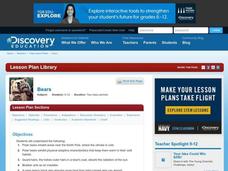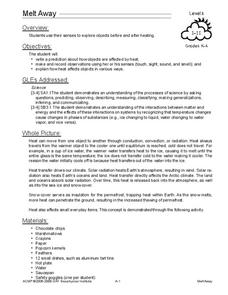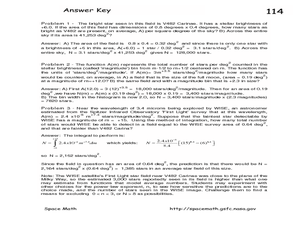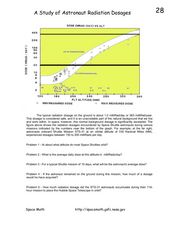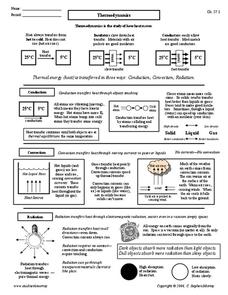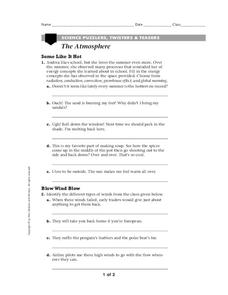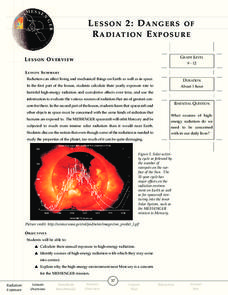Curated OER
What Wavelength Was That?
A combination of informative text, photos, and graphics comprise this sharp show on electromagnetic radiation. Some slides mention hands-on activities for demonstrating concepts, so if you want to include them you will need to figure out...
Curated OER
Chemistry Comes to Life
Although biochemistry of the human body is a vital topic, it doesn't have a chapter dedicated to it in many biology textbooks. If that's the case with your text, you can use this resource as a guide for designing your own lecture and as...
Curated OER
DATA ANALYSIS OF GROUND LEVEL OZONE
Sixth graders construct and interpret graphs from ozone data collected in the Phoenix area.
Curated OER
Radiation Budget
Students solve the mathematical word problems by looking at the Earth's Energy Budget Diagram. They will work in small groups and then develop their own unique math problems from the diagram and share with the class.
Curated OER
Satellites and the Radiation Budget
Students engage in a prelab discussion about the earth's radiation budget and global warming. They use "trading cards" to find specific websites to research radiation budget questions.
Curated OER
Sand or Rock? Finding Out From 1,000 km
Young scholars observe how measurements are made with different instruments. In this remote sensing activity students investigate the physical state of surfaces including the surfaces of the solar system.
Curated OER
Luminous Efficacy (Efficiency)
Students examine the basics of luminous efficacy and why it is used. In this light source lesson students test energy efficiency and the luminous efficiency for babies.
Curated OER
Simulating the Greenhouse Effect in a Terrarium
Students identify what factors effect global warming and how the greenhouse effect occurs. In this environmental lesson students view videos then complete an experiment using a terrarium to observe greenhouse gas.
Curated OER
Bears
Students study polar bears and their characteristics. In this bears lesson students divide into groups and design a model that shows the effectiveness of their layers that keep them warm.
Curated OER
Melt Away
Students explore objects before and after heating using their senses. In this matter and energy lesson, students experiment with a variety of objects and use their senses (except taste) to make predictions and record observations about...
Curated OER
Conduction, Convection and Radiation
Sixth graders listen to descriptions of types of heat to gain background knowledge In this heat lesson, 6th graders perform experiments to understand various types of heat transfer (convection, conduction and radiation.) Students assess...
Curated OER
Exploring Power-Law Functions Using WISE Data!
In this power-law functions activity, students solve 3 problems using data from the Wide-field Infrared Survey Experiment in the constellation Carina. Students use a photograph to determine the number of stars as bright as the brightest...
Curated OER
A Study of Astronaut Radiation Dosages
In this astronauts and radiation worksheet, students use a graph that shows the altitude of an astronaut versus the exposure to radiation to solve 5 problems. Students interpret the graph to express the amount of radiation at varying...
Curated OER
Why Are Hot Things Red?
In this radiation and temperature activity, students use 2 methods to derive the Wein Displacement law that shows the relationship between the temperature of a body to the frequency where the Planck curve's value is at its maximum....
Curated OER
Some Puzzling Thoughts about Space Radiation
In this space radiation worksheet, students solve 22 algebraic expressions for "x". They use their answers which correlate with a word in a word bank. They use these words to fill in the blanks of sentences about the effects of space...
Curated OER
Solar Storm Energy and Pie Graphs
In this solar storm energy and pie graphs instructional activity, students solve 5 problems using pie graphs that show the amount of solar energy that is converted into radiation, kinetic energy, flare energy and flare energy that is...
Curated OER
Thermodynamics
In this thermodynamics instructional activity, students read about conduction, convection and radiation. They answer 47 questions about heat transfer, thermal equilibrium, insulators, conductors and the states of matter.
Curated OER
Thermodynamics
In this thermodynamics worksheet, students learn about insulators and conductors. Students compare the three ways thermal energy is transferred: conduction, convection, and radiation. This worksheet has 22 matching, 1 multiple choice, 3...
Curated OER
Ultraviolet Reflections
In this environment worksheet, learners distinguish between UV-A, UV-B, and UV-C radiation and explain. Then they list various explanations of the source of ozone depletion. Students also describe why an increase in smog ozone does not...
Curated OER
The Atmosphere
In this atmosphere worksheet, students complete 20 fill in the blank questions about energy concepts, different types of winds, and air pollution.
Curated OER
UV Rays, sunscreen effectiveness
Middle schoolers identify and define that invisible UV rays can be harmful. Then they explore the effects of UV radiation on objects that react UV rays and what products are most effective in blocking UV rays. Students also make...
Curated OER
Hot Cans and Cold Cans
Learners investigate the physics of heating and cooling through conduction, convection, and radiation. Working in groups, they determine the best way to cool a can of water and warm a can of water. Temperature is taken at five minute...
Curated OER
Scientist Tracking Network
Students correlate surface radiation with mean surface temperature of several geographic regions. They observe how these parameters change with latitude and construct an understanding of the relationship of solar radiation to seasonal...
Curated OER
Dangers Of Radiation Exposure
Students investigate the effects of radiation exposure and how it can effect objects on earth and space. They conduct research using a variety of resources and use the information to create a project that is reflective of good research...










